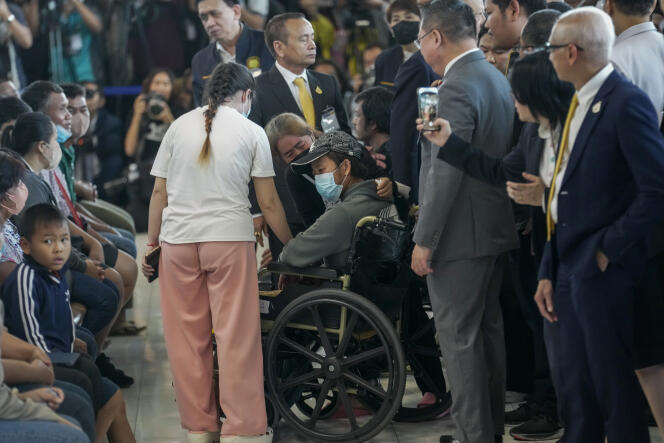


With 21 dead and 16 presumed kidnapped, Thailand is second only to the United States in the number of foreign victims. This heavy toll can be explained by the number of Thai migrants working in agriculture in Israel: some 30,000 are employed on farms and kibbutzim, including 5,000 around the Gaza Strip. This is not the first time that this population has suffered casualties: in May 2021, two Thai workers died in rocket attacks.
Most of these migrants, like Somkuan Pansa-ard, are men from Isan, the large rural region in north-east Thailand, the poorest in the kingdom. Aged 39 and employed on a fruit plantation for less than a year, the man had time to speak to his mother on Saturday, October 7, when attackers swooped down on his home. His family learned on Sunday that he had not survived.
Some of the Thai workers killed are said to have been killed in Kibbutz Alumim, where most of the inhabitants were saved after long hours of fighting. "In this kibbutz, the guards managed to kill a number of Hamas terrorists and prevent them from reaching the main residential areas. Unfortunately, a group of terrorists managed to reach the living quarters of several Thai farm workers and massacred them," reported the Israeli Telegram channel South First Responders which archives images sent by first aid teams. One video shows the inside of huts ransacked, with thick trails of blood on the floor.
The victims at Kibbutz Alumim also included 10 Nepalese students, according to a source in Kathmandu. Four others, present at the same location that day, survived. They were part of an 11-month program of paid internships for 269 students from several of the country's universities. Most of the 5,000 Nepalese people living in Israel are employed in the health and social services sectors.
The day before the attack, the Facebook page of one of the Nepalese citizens on the list of victims, Ganesh Nepali, showed images of the kibbutz, under the title "night view of Alumim," with a heart and two Israeli flags. The photo shows the high-security fence, the sky turning pink and peaceful alleys lined with flowers. Three days earlier, on October 3, he had written a long post commenting on the curfew that had just been decreed in Nepalgunj, a Nepalese town on the Indian border, after incidents between local Hindu and Muslim communities. Ironically, in the post, he lamented "the inability of religious people to accept each other's culture, which leads to religious wars."
You have 45.51% of this article left to read. The rest is for subscribers only.
